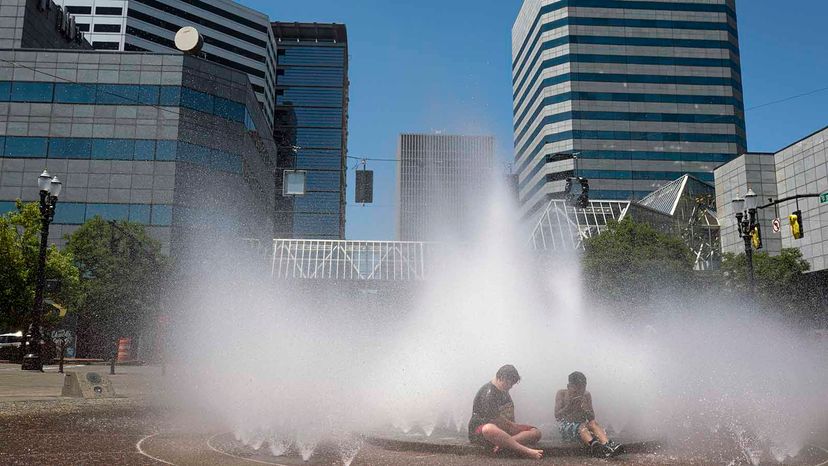
Kids play in the Salmon Springs Fountain on June 27, 2021 in Portland, Oregon, while record-breaking temperatures scorch the Northwest. NATHAN HOWARD/GETTY IMAGES
An unprecedented and dangerous heat wave is enveloping the Pacific Northwest in the United States, with high temperatures shattering records across the region. Seattle hit an all-time high of 104 degrees Fahrenheit (40 degrees Celsius) Sunday, June 27. It was so hot in Eugene, Oregon, where the U.S. Olympic track and field trials were being held, officials postponed the event on the final day until 8:30 p.m as the temperature soared to 105 degrees Fahrenheit (40.5 degrees Celsius).
And in Portland, Oregon, where the high in June typically is around 78 degrees Fahrenheit (25.5 degrees Celsius), residents are struggling to stay cool as the city set a scorching high record of 112 degrees Fahrenheit (44 degrees Celsius) Sunday. But that high isn’t expected to stand long because the forecast for Monday is even hotter — 115 degrees Fahrenheit (46 degrees Celsius). Lytton, British Columbia, broke the record Sunday for the hottest temperature ever recorded in Canada when it hit 116 degrees (46.6 degrees Celsius).
There are several reasons these high temperatures could be problematic for residents. First, they’re definitely not used to this type of intense heat. And second, many residents don’t have air conditioning. And that can make a heat wave like this deadly. The World Health Organization says exposure during these particular heat waves can cause exhaustion, confusion or even heart attacks, and can exacerbate existing health conditions such as cardiovascular and respiratory diseases.
But it’s relatively easy to prevent these types of adverse health effects during a heat wave with best practices, and if we just look out for our friends, family and neighbors.
What Is a Heat Wave?
You’d think it would be easy to define what a heat wave is, but actually it isn’t. Not even the World Meteorological Organization (WMO) has a standard definition for heat wave. But Science Direct defines it like this:These are rare events that vary in character and impact even in the same location. A heat wave occurs in a region when abnormally high temperatures are recorded over a long period of time. These high temperatures do not only refer to maximum temperatures, typically recorded during the day, but also those staying high enough overnight, making the environment highly uncomfortable. High levels of humidity and very light winds, if present, exacerbate thermal stress to people. Thus, although a heat wave is a meteorological event, it cannot be assessed without reference to human impacts.
Though defining what constitutes a heat wave might be difficult, agreeing that they are increasing seems to be easy. The U.S. Global Change Research Program Climate Science Special Report shows that surface air temperature has increased by about 1.8 degrees Fahrenheit (1.0 degree Celsius) between 1901 and 2016. And the report shows that the current time period is the warmest in the history of modern civilization. During the last few years, the world has experienced the warmest temperatures on record. These weather trends, and heat waves, are expected to continue, according to the Global Change Report.
This graphic from NOAA shows how the number of heat waves has increased in the United States since 1960.NOAA
So what is a human to do? How should we plan to manage in the future when these scorching temperatures become, gasp, the norm? One thing is to have a heat wave safety plan and a healthy dose of respect for the destructive potential of this form of extreme weather. Here are five heat wave safety tips to help you deal with the dangers:
1. Dress for the Weather
It may seem like a no brainer, but during a heat wave, you have to dress appropriately. Wear loose, light-colored clothing; UV-protective and moisture-wicking clothing are best if you have to work or be outside. This will help protect your skin from sunburn and help absorb sweat to keep you a little cooler. Be sure to protect your face, hands and any other exposed skin with sunscreen and wear a hat and sunglasses.
2. Avoid Strenuous Outdoor Activities
If possible, take part in outdoor activities during the morning hours, or postpone them until evening when temperatures are cooler. Take frequent breaks in the shade. If you’re working outside in the heat, and the activity makes your heart pound or you’re gasping for breath, stop and get inside to cool off and rest, especially if you feel lightheaded, confused or faint. Use the buddy system, too. If you’re working in the heat, check on your co-workers — and have them check in on you. Heat-related illness can make you confused or even lose consciousness.
3. Stay Hydrated!
Perspiration is your body’s way of staying cool, but that moisture loss has to be replenished regularly. If you have to be outside during a heat wave, it’s imperative to drink up, even if you’re not thirsty. Avoid sugary or alcoholic drinks; these will actually make you lose more fluids. You also want to stick to drinks that aren’t super-cold. That sounds crazy, right? But ice-cold water can actually cause stomach cramps. If you’re on a fluid-restrictive diet or have a problem with fluid retention, talk to your doctor before drinking more than your normally prescribed amount.
4. Keep Cool
Ideally during a heat wave, you want to say indoors where there’s air conditioning. If that’s not possible, many cities open up cooling centers during heat waves to provide citizens with relief, especially in areas where air conditioning isn’t prevalent. (Due to COVID restrictions, you’ll have to social distance and wear masks while there.) You can also try to go to a public place that has A/C, like a library, mall or a movie theater, assuming they are open where you live. Again, wear a mask for safety and practice social distancing.
You can also use fans, but keep in mind when temperatures are in the 90s or higher, fans won’t prevent heat-related illness. Taking a cool shower or bath is a much better option. Eat only light, cool foods such as fruit and salads. They’re easier to digest than hot, heavy meals, and your home won’t heat up when you prepare them.
Austun Wilde rests with her two dogs at a cooling center in the Oregon Convention Center in Portland, Oregon. Getting out of the heat to cool off is critical to avoiding heat exhaustion.NATHAN HOWARD/GETTY IMAGES
5: Protect Those Most at Risk
Heat-related illness can affect anyone, but some people are particularly at risk. If you live with, or know people, who fit into any of these categories, check on them frequently during a heat wave.
- infants and young children
- the elderly or sick
- pets
- people who are overweight
- people without air conditioning
- people who work outside
Of course it goes without saying you should never leave children or pets in a car, as temps can soar inside even with a window cracked, heat wave or not. The CDC suggests we monitor adults at risk at least twice a day for signs of heat exhaustion or heat stroke, and infants and young children, even more frequently.Now That’s Scary
A heat stroke is a medical emergency. If you experience a body temperature of 103 degrees Fahrenheit (39 degrees Celsius) or higher; hot, red, dry, or damp skin; fast, strong pulse; headache; dizziness, nausea and confusion; or lose consciousness the CDC says to call 911 immediately and seek medical attention.
Originally Published: Aug 19, 2020Citation
More Awesome Stuff
Up NextWhat’s the Difference Between Global Warming and Climate Change?EXPLORE MOREWellnessHow to Walk in Bad WeatherHome ImprovementHow Infrared Grills WorkSurvivalCan the sun kill you?Forces of NatureDid Africa Just Record Its Hottest Temperature Ever?Forces of NatureScorching Heat in Pakistan May Have Set a World RecordPersonal FinanceHow much can you save by turning off the A/C?You May LikeEarth Hits 400 Straight Months of HotEXPLORE MOREEnvironmental ScienceWhat is the urban heat island effect?WellnessWhat vitamins help you deal with the summer heat?AppliancesHow Air Conditioners WorkUnder the HoodWhat motorcycle accessories will help me stay cool?Forces of NatureHow Weather WorksSurvivalHow to Avoid HypothermiaKeep ReadingInside Death Valley, the Hottest Place on EarthEXPLORE MORE
Explore More HowStuffWorks:ScienceForces of NatureNatural Disasters
Advertisement

Comments are closed